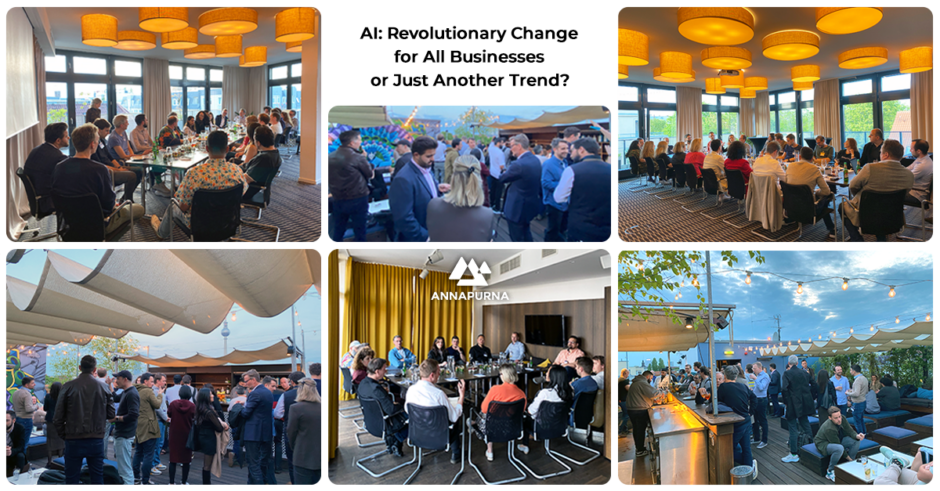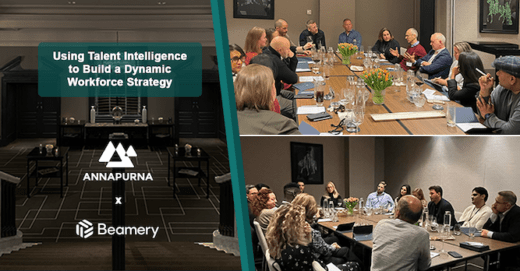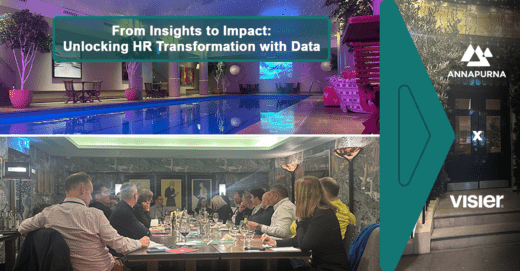Annapurna recently hosted a networking event for some of Berlin’s industry leaders representing the world of Sales, Marketing, HR, Technology and Founders.
The topic of conversation was all around ‘AI: Revolutionary change for all businesses or just another trend?’
The session scratched the surface on the vast topic of AI and its current impact, with the group being split into 3 round table conversations. Each group had a slightly nuanced flow of conversation, which were hosted by Becky Finnegan (Associate Director at Annapurna), Tom Walsh (Practice Lead – Senior Appointments at Annapurna) & Florian Felsenreich (VP of Customer Success at Annapurna).
Some of the key themes and findings followed the below:
Technology & Tools
With the array of tools that are currently being used in day-to-day operations and the rapidly evolving capabilities of the technology, how can we ensure we are picking the best one for our organisation and scenario? The conversation also looked at the challenges with current or legacy data sets and how companies can use this more advantageously.
As the role of Artificial Intelligence and Machine Learning develop and start to become an integral part, we must be asking the right questions. How do the algorithms impact us? What about the bias elements? How are we teaching these machines?
The Social Impact
What is the cost vs opportunity to society? We must be ensuring we are aware, knowledgeable and educate our employees about content and the rights associated with it. How will we resolve this going forward?
The Legal Impact
Who is responsible for the legislation that impacts the way we use AI in the workplace? How will localised laws impact global companies and how can we ensure we are clued up and the knowledge is shared internally?
There is an obvious battle across the world to adopt AI and utilise it to its best potential, with USA and China battling for the top spots. There are specific challenges in countries where legislation may prove challenging to keep up with the pace of change from AI, such as Germany. As leaders, we must know our limitations and opportunities.
Today’s Business World
Which jobs might become redundant? The clichéd question is the one on everyone’s lips at the moment but actually is not the correct question to be asking. We should be asking which jobs can be made more efficient. ChatGPT is useful for everyone on a lot of tasks, but can it truly take over all roles? Is the rate of change with AI going to follow prior technological trends or will we move quicker due to the nature of how powerful it can be?
There will always be a need for human interaction as we start to work more with technology but what will be the impact on creativity and critical thinking skills? Will bigger & richer companies lead the way in R&D? Or will smaller companies build strong use-cases to roll out the tech quicker?
What about the Future?
There are some fundamental changes that need to be made across the education system. Are we asking the right questions? How can we transform the education system for future generations to become best-in-class AI users? We must be ensuring that AI becomes part of the solution early on in people’s learning journeys so it becomes second nature.
As roles start to develop and evolve due to the impact of technology making them more efficient, how will we repurpose some of the workforces if their roles are no longer needed?
Is it all doom & gloom? There is clearly an element of fearing the unknown in the future and the uncertainty leaves everyone a bit on edge from social impacts to the business world, to the future state of the economy, wars, environment and social norms; many however conclude that we can benefit on focusing on the current challenges which we have a stronger impact in influencing.



